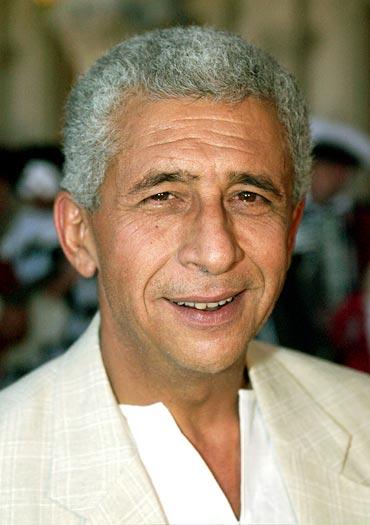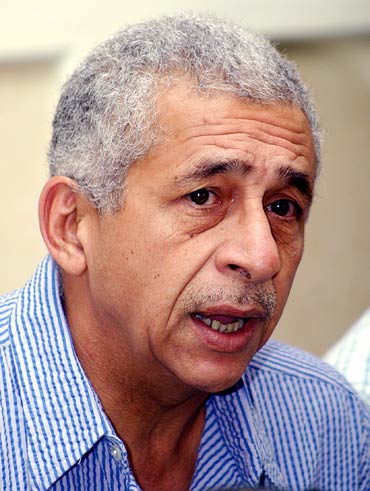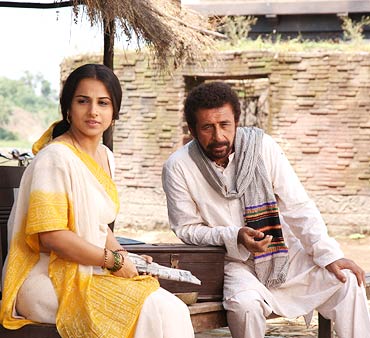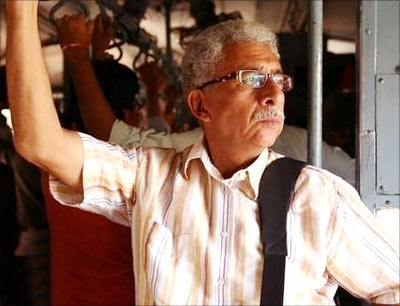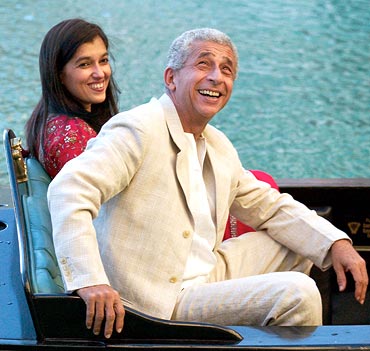 | « Back to article | Print this article |
'Actors consider themselves the centre of the universe'
"When I first dreamt of becoming a movie star," says one of India's least starry but most respected actors, "I wanted to be a Gary Cooper, I wanted to be rich and famous, living in palaces and wearing dark glasses and white suits."
He looks around, curls his lip slightly. "I didn't want to be an arty type of guy trudging up hills and through streams!"
Coming from Naseeruddin Shah, these are words that need a garnishing of salt. We're at a location shooting for a low-budget film in the hill town of Vagamon in Kerala, where traipsing up and down rough mountain roads is very much part of the deal. So are long periods of waiting while heavy equipment is lugged around.
Many scenes feature animals that tend not to be considerate of the best-laid shooting schedules of humans. Besides, the long Rastafarian braids that Shah has had stitched on to his own hair are heavy and uncomfortable in the heat, and he's stuck with them till the month-long shoot is over.
The actor's mood ebbs and flows. One minute he's the picture of joviality, talking about how he finds it stimulating to work with less experienced directors; the next he's feeling depressed about the haphazardness of the shot division.
He maintains that the long climbs don't tire him out -- "I welcome it, one doesn't get to walk in Mumbai" -- but the fatigue shows at times. "I'm the world champion of thumb-twiddling now," he says glumly, at the end of a long day that began badly because of a miscommunication (he was up and ready by 7.30 am though he was only required four hours later).
And yet, here he is, far from those notional palaces and white suits, working on a non-Bollywood project made with a paltry Rs 40 lakh.
When writer-director Anup Kurian -- whose first feature, the gentle Manasarovar, won praise on the festival circuit a few years ago without ever reaching a large audience -- approached him for The Hunt, Shah agreed immediately.
In a sense, it was a continuation of what he was doing 30 years ago, as the leading light of Hindi cinema's 'parallel star system', encouraging small movies, saying yes to resource-strapped directors who came to him with offbeat scripts.
Now in his sixtieth year, Naseeruddin Shah has been a thoroughly honourable performer, working in both non-mainstream and mainstream cinema for over three decades.
He has excelled in stark dramas made by Shyam Benegal and Mrinal Sen, and he has been just as convincing -- given the token suspension of disbelief -- in masala-movie setpieces such as the Tirchi Topiwale song in Tridev.
Even when he started working three shifts a day in assembly-line commercial films (which he did to line his bank balance, he freely admits, making the finger-flicking gesture that is somehow permanently associated with the word rokda in Bollywood), he found the time for 'small' movies. Such as this one.
'You don't need Rs 20 crore to make a good, commercially viable film'
On his current film
The Hunt centres on an inscrutable loner known only as Colonel, who cultivates marijuana in his forest retreat (an activity that makes him the object of unwanted attention), and the tentative relationship he develops with a young woman placed in his care.
"What impressed me," says Shah, "was that here was a sincere attempt to make a popular film without blowing up money on unnecessary things. The ballooning budgets of Bollywood are getting out of hand, and it's important for people to realise that you don't need Rs 20 crore to make a good, commercially viable film."
Having taken on the role, Shah immediately set about trying to understand Colonel. The dreadlock hairstyle was his idea. It seems an overly flamboyant touch at first and takes a bit of getting used to, but for Shah, being a serious actor means working out what best suits the character. "This is a hermit-like figure, a man people are wary of approaching, and the hair adds to his enigma."
In a classic case of an actor getting a fix on a character by drawing on a past role, he conceptualised Colonel as an older version of the muscular cop he played in the 1987 action film Jalwa.
"This guy busted a narcotics ring, shot the head guy and was dismissed from the service for his pains. So he says okay, f@$! honesty, f@#! the police force after what they've done to me."
'There was a time when I only wanted to show off'
On acting
For all the thought he puts into preparing for his roles, Shah gets impatient and crabby when people theorise too much about acting technique.
"There's so much hocus-pocus about acting styles," he complains, "there's too much mysticism attached to it. But it's a craft like any other -- it's something you have to work hard at."
When an actor expresses truth in his performance, he feels, you recognise it regardless of the technique used to get there.
"It's not a question of underacting or overacting -- I don't believe in those terms -- it's a question of behaving truthfully, in a situation where you're unlocking your door for example, or parking your bicycle."
Does he need a different approach when playing a character with a look or accent different from his own -- the small-time crook Khalujaan in Ishqiya, for instance?
"No, the intention is not to look different in a part," he says. "There was a time when I only wanted to show off, but as I've grown older I've realised that acting isn't an end in itself. You act to communicate something, and if you have to use an accent or become thin or fat, that's part of your job."
"Actors have huge egos and consider themselves the centre of the universe, but I'm trying to overcome that, and this is why I've started teaching so much. It's important to communicate to youngsters that everyone can't get leading roles all their lives."
When he's in a good temper Shah is a wonderful raconteur, full of observations on varied subjects -- the different expressions in the eyes of male and female elephants, the ethics of taking corals from the sea-bed and placing them in a living room, "they are dead bodies -- it's like grave-robbing."
After accidentally hitting his head against the metal arm of a reflector while filming an action scene, he quips, "It's okay, I'll bump it again and the memory will come back" -- a dig at one of the popular tropes of mainstream Hindi cinema.
However, his melancholic interludes are revealing too. "I've lost the hope of seeing a truly great film being made in this country, at least in my lifetime," he sighs, "Time and again, people screw up the opportunities they have."
Even so, he believes the overall quality of today's offbeat films is better -- "scriptwise, craftwise, understanding-wise" -- than the "parallel cinema" of the 70s and 80s.
"Filmmakers like Anurag Kashyap are very exciting and have honed their craft. It's too early to celebrate, but there's hope." He finds it encouraging that the best directors of today are making films about the things they personally know and care about. "Neeraj Pandey made A Wednesday after suffering firsthand what the Common Man in that film talks about."
He pauses, rolls his eyes. "Unlike some of the older guys, who were sitting on Malabar Hill and making films about the starving peasants of Bihar!"
'Mr Bachchan has become a synthetic person'
On speaking his mind
This sort of plain-speaking makes Shah an anomaly in a profession where tact is considered the supreme virtue. Consider his cutting remarks -- unaccompanied by the caveat "this is off the record" -- about actors "who have built their careers on being synthetic. And we expect them to play real people? They just can't do it! Even the most gifted of them, Mr Bachchan, can't do it any more. He has become a synthetic person."
Or his observation that the direction course at the Films and Television Institute of India should be scrapped and only specialised courses retained, because "Institute directors have their heads stuffed with nonsense about a film being 'their film' -- they are full of themselves and have no sense of human behaviour."
As it is, he points out, filmmaking in Bollywood is completely centred on a star's image rather than on how a character would really behave. "Amitabhji hain toh aisi kursi mein baithenge. Naseeruddin Shah ko angerwallah scene do."
Doesn't the bluntness have repercussions for a high-profile Bollywood actor?
"I've been lucky enough never to be in a position where I've had to worry about saying the right things," he replies, "I didn't take favours, and I don't owe anyone anything."
Some of his harshest criticism is directed at the art-house directors with whom he began his career. "They started hankering after big budgets and saleable actors, and the moment you do this the whole bloody odour of a project changes."
At the same time he's upfront about the fact that he himself did many commercial films for money, and then you wonder is he holding his former colleagues to unfairly high standards?
'Sometimes I want to simply continue with the rehearsals without putting on the actual performance'
On roads less taken
But there's a deeper subtext to Shah's disgruntlement with directors, a man this individualistic and intelligent isn't content to be a chess piece, unquestioningly doing what he's told.
This aspect of his personality ties in with his growing discontent with the theatre of sound and fury and fancy sets. In recent years he has gravitated towards the ideal of poor theatre as defined by the Polish director Jerzy Grotowski.
"He defined theatre as one actor, one audience, when I speak, you listen; when you speak, I listen. This makes complete sense to me."
Last year, Shah participated in a few performances of dastangoi, the recently revived art of oral storytelling. It was hard work, learning archaic Urdu, and then performing with much younger actors who were familiar with the form, "but as an artiste, it was invigorating."
There's a new quietude in his tone when he speaks of his enthusiasm for intimate storytelling. Or about his theatre group Motley and how he wants to keep himself off-stage in its productions, "because the group should outlive me".
Towards the end of our conversation he mentions his admiration for the late J D Salinger, an artist who let his work do the talking, keeping himself in the background.
"There are times," he says, "when I'm preparing for a play and I want to simply continue with the rehearsals without putting on the actual performance."
Of course, famous actors don't have the freedom to be recluses in the way writers do, but one gets the impression that if anyone can pull it off, Naseeruddin Shah can.
